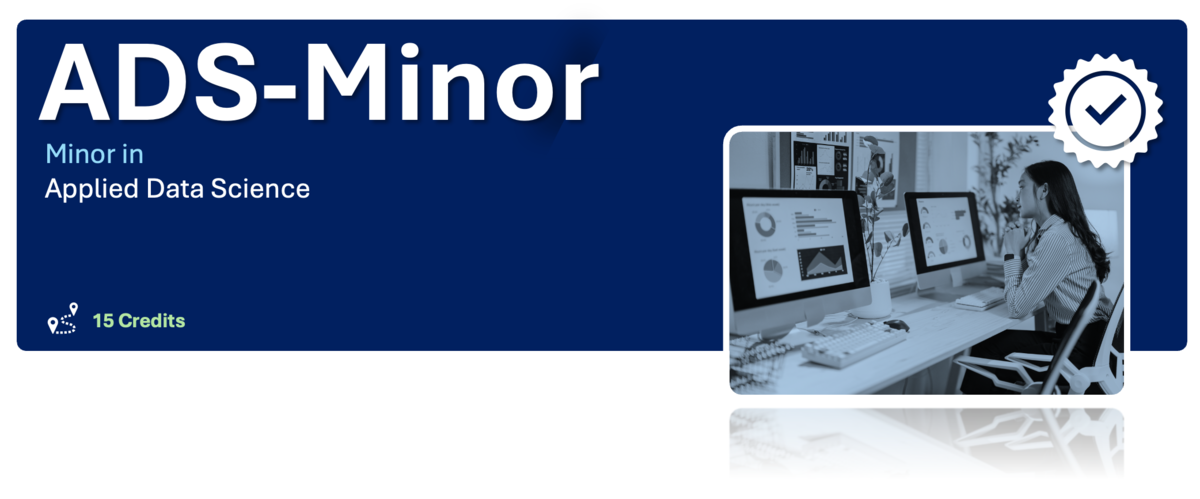
Minor in Applied Data Science (ADS-Minor) (2025/26 AY onwards)
The Minor in Applied Data Science is offered by the Department of Applied Data Science at Hong Kong Shue Yan University. This initiative addresses the growing demand for data science skills in various industries, particularly as Hong Kong aims to become a hub for innovation and technology. The program targets non-ADS students, allowing them to enhance their employability by integrating essential data analytic competencies into their primary fields of study, thereby preparing them for careers in an increasingly data-driven job market.
Students are required to complete a minimum of 15 credits, including two compulsory courses and three elective courses.
The structure of the programme is as follows:
|
Course List
|
|||
|
Course Code
|
Course Title
|
Credits
|
Pre-requisite(s)
|
|
Core Courses
|
|||
|
ADS100
|
Introduction to Data Science
|
3
|
NIL
|
|
ADS210
|
Digital Humanities: Theories and Methods
|
3
|
NIL
|
|
Electives Courses (Choose 3 courses in total out of the following 2 categories)
|
|||
|
Technical Data Science Electives (Choose at least 1 course out of 5)
|
|||
|
ADS151 #
|
Python for Data Science
|
3
|
NIL
|
|
ADS230
|
Introduction to Database Systems
|
3
|
NIL
|
|
ADS370
|
R for Data Science
|
3
|
NIL
|
|
ADS360
|
Computational Thinking
|
3
|
NIL
|
|
ADS320 #
|
Introduction to Data Mining
|
3
|
NIL
|
|
Applications of Data Science Electives (Choose at least 1 course out of 5)
|
|||
|
ADS250 #
|
Introduction to Data Visualization and VR/AR
|
3
|
NIL
|
|
ADS330
|
Social Media Data Analytics
|
3
|
ADS151
ADS230
|
|
ADS340
|
Big Data Ecosystem
|
3
|
NIL
|
|
ADS430
|
Data Science Ethics
|
3
|
NIL
|
|
ADS480
|
Cloud Computing
|
3
|
ADS100
|
# Note: Double counting of overlapping courses (for students from the Departments of Economics and Finance, Journalism and Communication, and Sociology respectively) is allowed for up to 6 credits. These credits will only count once towards the total credits attained by the student. Exceeding this limit of 6 credits, students should take replacement courses chosen from the list of Minor courses to fulfil the Minor credit requirement. The courses include:
|
|
Students may apply for double counting of overlapping courses if they have completed the following course in their Major:
|
|
ADS151: Python for Data Science
|
FINT200: Fundamentals of Fintech Computing
|
|
ADS250: Introduction to Data Visualization and VR/AR
|
MDIT220: Understanding VR/AR (Unity 1 & Unreal 1)
|
|
ADS320: Introduction to Data Mining
|
SOC434: Mining Data for Social Research
|
- Compulsory Courses
The two compulsory courses, totalling 6 credits, are designed to equip non-ADS students with essential knowledge and skills in the field of data science:
|
Compulsory Course(s)/Credit(s)
|
Description(s)
|
|
ADS100: Introduction to Data Science (3 credits)
|
This course serves as a foundational entry point into the field of data science. It encompasses fundamental concepts such as data collection, data cleaning, exploratory data analysis, and basic statistical techniques. Students will participate in hands-on projects that enable them to apply these concepts using real-world datasets. By the conclusion of the course, students will be well-equipped to comprehend the data science workflow and its applications in various contexts.
|
|
ADS210: Digital Humanities: Theories and Methods (3 credits)
|
This course examines the intersection of digital technology and the humanities, emphasizing how data science methodologies can enhance research in disciplines such as literature, history, and cultural studies. Students will explore both qualitative and quantitative methods in the humanities, including text analysis and data visualization. The course aims to illustrate the applicability of data science skills in enriching critical analysis and interpretation of cultural artifacts.
|
- Elective Courses
Students are required to select three elective courses, earning a minimum of 3 credits in each of the two elective categories, for a total of 9 credits. These courses are drawn from a curated list that facilitates a more in-depth exploration of specific areas within data science. The elective courses are organized into two categories: 1) Technical Data Science Electives and 2) Applications of Data Science Electives.
Technical Data Science Electives
These courses emphasize the technical skills and programming languages that are essential for data analysis:
|
Elective Course(s)/Credit(s)
|
Description(s)
|
|
ADS151: Python for Data Science #
|
This course introduces students to Python programming, with a focus on its applications in data analysis and visualization. Students will learn to utilize libraries such as Pandas, NumPy, and Matplotlib to manipulate data and produce informative visualizations.
|
|
ADS230: Introduction to Database Systems
(3 credits)
|
This course provides an overview of database systems, covering fundamental concepts such as data modelling, database design, and SQL. Students will learn how to interact with databases and manage data effectively.
|
|
ADS370: R for Data Science
(3 credits)
|
This course focuses on R programming, another widely utilized language in data analysis. Students will engage with statistical techniques and data visualization, equipping them to manage data in various formats and apply statistical methods effectively.
|
|
ADS360: Computational Thinking
(3 credits)
|
This course fosters students' problem-solving skills through the lens of computational thinking. It emphasizes algorithmic reasoning and the application of computational methods to address complex problems across various fields.
|
|
ADS320: Introduction to Data Mining #
|
This course introduces students to data mining techniques and their applications across various fields. Students will learn key concepts such as classification and clustering while gaining proficiency in relevant software and programming languages to analyse and interpret complex datasets effectively.
|
Applications of Data Science Electives
These courses demonstrate how data science can be applied across various sectors and contexts:
|
Elective Course(s)/Credit(s)
|
Description(s)
|
|
ADS250: Introduction to Data Visualization and VR/AR #
|
This course introduces the principles of effective data visualization and explore technologies such as virtual reality (VR) and augmented reality (AR) for data presentation. The course will emphasize the art of storytelling through data and highlight the significance of visual communication.
|
|
ADS330: Social Media Data Analytics
(3 credits)
|
This course explores the role of data analytics in understanding social media dynamics. Students will analyse social media data to derive insights into user behaviour, trends, and effective engagement strategies.
|
|
ADS340: Big Data Ecosystem
(3 credits)
|
This course introduces the components of the big data ecosystem, including data storage technologies, processing frameworks, and analytics tools. This knowledge is essential for understanding how organizations utilize big data for strategic decision-making.
|
|
ADS430: Data Science Ethics
(3 credits)
|
This course will address topics such as data privacy, algorithmic bias, and the social responsibilities of data scientists.
|
|
ADS480: Cloud Computing
(3 credits)
|
This course introduces students to the concepts and technologies of cloud computing, with an emphasis on how cloud services can enhance data storage, processing, and analysis. Students will explore various cloud platforms, deployment models, and the implications of cloud computing for data science applications.
|
For more information, please visit: https://www.hksyu.edu/en/education/minor-programme



